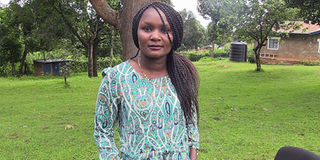Why West Pokot girls choose to undergo FGM

Domtila Chesang, an anti-FGM campaigner. She says the stigma of being ostracised is forcing many girls and women in West Pokot to undergo the cut.
What you need to know:
- The outlawed cultural practice is highly recognised and valued among the Pokot.
- It symbolises transition from girlhood to womanhood, and done on girls as young as 10 years old.
Many young women and girls in West Pokot are increasingly opting for female genital mutilation (FGM) to beat the highly entrenched stigma associated with not being cut.
The community is still strict on cultural norms, including harmful ones. According to Domitila Chesang, a leading anti-FGM activist, women who have not undergone the cut are treated like children, hence not allowed to do certain "important domestic chores".
Ms Chesang tells Nation.Africa that women who are not cut are, for example, not allowed to milk and cook for guests, cannot be assisted to deliver by traditional birth attendants, and are not allowed to accompany their age-mates to the river or market.
In instances where they meet at the river, "the uncut" are not allowed to fetch water ahead of those who have undergone FGM.
“The husband of the woman who has not been cut is not allowed to go on a raid together with other warriors as it is believed he will bring bad luck,” says Ms Chesang.
She says this kind of discrimination pushes women and girls to undergo FGM of their own violation.
Ms Chesang is the founder of I-Am Response Foundation, an organisation that fights FGM and child marriages, which are violations of human rights.
In-laws
Pressure from mothers-in-law and husbands has also been blamed for rising cases. Mothers-in-law do not allow uncircumcised women in their homes. This usually forces many newly married women to undergo the cut.
Elders have also been accused of being the biggest obstacle to the fight against the vice.
The outlawed cultural practice is highly valued among the Pokot. It symbolises transition from girlhood to womanhood, and is done on girls as young as 10 years old, despite its devastating physical and psychological effects.
Done with a razor blade or knife (often with no anesthesia and no disinfectant), it can cause severe pain, bleeding, and swelling that may interfere with the passing of urine or faeces.
Also read: End FGM to free girl child
Kenya enacted the Prohibition of Female Genital Mutilation Act in 2011. In 2019, it adopted a revised National Policy for the Eradication of FGM in line with the Sustainable Development Goal 5, which seeks to eliminate the practice by 2030.
However, despite the move, FGM is still prevalent. The Kenya Demographic Health Survey 2022 shows the national FGM prevalence now stands at 15 per cent, down from 21 per cent in 2014 and 38 per cent in 1998.
The survey adds that 45 per cent of girls and women aged 15–49 were circumcised at age 10–14 and 30 per cent at age five to nine. Most female circumcisions were found to have been performed by traditional circumcisers and birth attendants.
However, 86 per cent of girls aged 0–14 and 82 per cent for women aged 15–49 were circumcised by a medical professional (doctor, nurse, or midwife).
Among women aged 15–49 who underwent FGM, 72 per cent reported they were circumcised at their home, 14 per cent at a relative’s home, nine per cent at a health facility (hospital, clinic), and five per cent at other places (forest, river banks, or caves).



